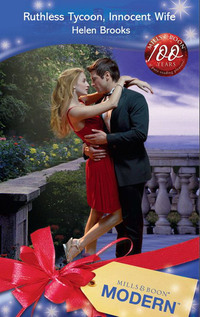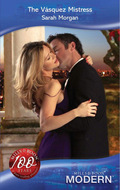Kitap dosya olarak indirilemez ancak uygulamamız üzerinden veya online olarak web sitemizden okunabilir.
Kitabı oku: «Ruthless Tycoon, Innocent Wife»
‘It’s gone two in the morning,’ she said breathlessly. ‘You shouldn’t be here.’
‘No, I shouldn’t.’
He bent towards her and she did nothing to avoid him. One hand closed around her wrist, drawing her into him, and the other pressed into the small of her back, urging her still closer. Marianne felt she couldn’t breathe as she waited for him to kiss her.
When his mouth closed over hers she felt the impact in every part of her body, even though his lips were gentle, even sweet. She had expected … She didn’t know what she had expected, but his tenderness was her undoing. It cut through any defences like a knife through butter, and she found herself wanting more as she pressed into him in a manner which would have shocked her only seconds before.
‘This is crazy.’ His voice was husky against her mouth, and suddenly the tempo of the kiss changed, his lips becoming more demanding as he sensed her response. ‘Madness…’
She agreed with him—but was powerless to move away.
Helen Brooks lives in Northamptonshire and is married with three children. As she is a committed Christian, busy housewife and mother, her spare time is at a premium, but her hobbies include reading, swimming and gardening. Her long-cherished aspiration to write became a reality when she put pen to paper on reaching the age of forty, and sent the result off to Mills & Boon.
Recent titles by the same author:
A RUTHLESS AGREEMENT
THE ITALIAN TYCOON’S BRIDE
THE BILLIONAIRE’S MARRIAGE MISSION
A FAMILY FOR HAWTHORN FARM*
HIS CHRISTMAS BRIDE
THE BILLIONAIRE BOSS’S SECRETARY BRIDE
*part of the Winter Waifs anthology
RUTHLESS TYCOON, INNOCENT WIFE
BY
HELEN BROOKS
MILLS & BOON
Before you start reading, why not sign up?
Thank you for downloading this Mills & Boon book. If you want to hear about exclusive discounts, special offers and competitions, sign up to our email newsletter today!
Or simply visit
Mills & Boon emails are completely free to receive and you can unsubscribe at any time via the link in any email we send you.
CHAPTER ONE
JUST a few more hours and then everyone would leave. She could do this; she had to. It was what her parents would have expected of her. She could almost hear her mother’s voice—warm, faintly admonishing—saying, ‘Come on, Annie, keep the flag flying high, sweetie-pie.’ It had been one of her mother’s favourite sayings when as a small child she had tried to duck out of anything unpleasant.
Marianne Carr drew in a deep breath and straightened her drooping shoulders. Checking her reflection in the bedroom mirror, she satisfied herself that the recent flood of tears didn’t show and then left the room. On walking down the wide staircase she could see the odd person or two in the hall, but the main body of guests were in the drawing room. They were talking in the hushed tones one used at funeral receptions.
Crystal, her mother’s housekeeper and friend who’d been one of the family for as long as Marianne could remember, met her at the foot of the stairs. Crystal’s eyes were pink-rimmed and her voice wobbly when she said, ‘Shall I tell them to come through to the dining room now? Everything’s ready.’
Marianne nodded. She hugged Crystal for a moment, a catch in her voice as she murmured, ‘You’ve been a tower of strength to me, Crystal. I couldn’t have got through this without you.’
Crystal’s plump chin trembled as she fought for control. ‘I don’t feel I have been. I still find it hard to believe they won’t walk in the door, to be truthful.’
‘I know. I feel the same.’ It had been Crystal the police had notified the night of her parents’ terrible car crash, two policemen calling at the house. Crystal had immediately phoned her and she had left her flat in London within minutes. On the journey back to Cornwall she had been in deep shock, praying the whole time that she wouldn’t be too late. Crystal had told her her father had been pronounced dead at the scene of the accident but her mother was still clinging to life.
By the time she reached the hospital her mother had been able to tell the police that her father had collapsed at the wheel and the car had ploughed off the road, wrapping itself round a tree. She had had five precious minutes with the woman who had been her best friend as well as her mother. Five minutes to last the rest of her life.
The post-mortem had revealed that her father had suffered a massive heart attack and had probably been dead before the car had hit the tree. It was generally acknowledged it was the worst of luck that he had been driving at the time.
Forcing her thoughts into neutral, Marianne realised Crystal was dabbing her eyes again. ‘I’ll go and announce they can come through, Crystal. OK?’
‘No, no. If you can hold it together, then so can I,’ Crystal protested shakily. ‘I’ll do it.’
The two looked at each other for a long moment, drawing from each other’s strength in the midst of their grief, and then Crystal bustled off.
Marianne glanced at her watch, a present from her parents for her twenty-first six years before. One o’clock. Hopefully the assembled family and friends would all be gone by four. She heard Tom Blackthorn’s voice as she reached the drawing-room door and saw him standing with a tall dark man she’d vaguely noticed earlier. Tom was her father’s solicitor and friend; he’d asked to stay behind after the others had gone so he could read her parents’ will to her. She knew it wasn’t just that, though. He would feel it his duty to point out that a huge rambling place like Seacrest was too much for a young woman to take on, that it would make more sense to sell it.
She wouldn’t listen to him. She mentally nodded to the thought. Seacrest was in her blood. It had been in her father’s, and his father before him. It had been her great-great-grandfather who had built the massive stone house on the top of the cliff over one hundred and fifty years ago, and Carrs had lived in Seacrest ever since. Although she had inherited it far too soon—her eyes darkened with pain—she would keep her beloved house going while she had breath in her body. It was part of her, part of her parents.
‘Ah, Annie.’ Tom had known her since she was a baby and, as he put out a fatherly arm and drew her into his side, she had to bite back the tears. To combat the weakness she kept her spine straight and her lips clamped together. ‘I’d like you to meet the son of one of your father’s old friends. Rafe Steed, Marianne Carr.’
Her inward battle to remain composed and in control in spite of her grief during the funeral had rendered her almost blind and deaf throughout. Now, for the first time that day, she looked properly at the man she had noticed earlier at the church and then the graveside with Tom, seeing him as a person rather than another sombre-clothed shape among many sombre-clothed shapes.
The polite, How do you do? which had sprung to her lips was never voiced. He was tall—very tall—and broad with it. He wasn’t smiling. Not that it was the time and place for smiles, she supposed, but there was something in the piercing blue eyes that was unnerving. After what seemed an endless moment, he said, ‘Please accept the condolences of my father, Miss Carr. Ill health has prevented him making the journey from the States himself but he wanted to pay his respects.’
His voice ran over Marianne’s overstretched nerves like icy water. It was deep, cold and liquid-smooth although the timbre was as hard as polished steel.
Mesmerised more by the coolness of his manner than his height and rugged good looks, Marianne said hesitantly, ‘Thank you.’
She could not recall her father or mother speaking of anyone called Steed. Why had this old friend who lived on the other side of the ocean sent his son to represent him after all this time? It seemed strange. ‘My father and yours were friends?’ she said carefully. ‘I’m sorry but I don’t remember the name.’
‘No reason why you should.’ The big powerful body appeared relaxed but this did not detract from the energy and force it projected. ‘My father and yours grew up together but my father left for America when he was in his early twenties.’
His accent was the type of lazy American drawl that was so attractive on the silver screen and even the lack of warmth couldn’t negate its appeal. Marianne wondered why this stranger disliked her, because he did. It was in his manner, the set of his face and, most of all, his cold, cold eyes.
‘I see.’ She didn’t but it didn’t matter as the weight of her loss pressed down on her again. ‘Please thank your father for me, won’t you. I hope he is well soon.’
‘My father is dying, Miss Carr, but slowly.’
The very sharply defined planes and angles of the masculine face showed no emotion as Marianne stared at him. She was completely taken aback but, before she could bring her mind to bear, Tom Blackthorn said, ‘I’m sorry to hear that, Rafe. You didn’t say before. We had some good times when we were younger—your father, Annie’s and myself. The Three Musketeers.’
There was a small silence when Marianne wondered if Rafe Steed was going to ignore the man at his side, his eyes still intent on her face. Then, to her relief, the rapier gaze moved and he turned to Tom.
His smile wintry, he said, ‘So I understand.’
What an objectionable individual. Marianne couldn’t believe anyone would come to a funeral and then be so covertly rude to the bereaved. Drawing herself up to her full height of five feet six inches, which unfortunately was still almost a foot below the son of her father’s old friend which, she felt, put her at something of a disadvantage, she said as coldly as he had spoken, ‘Please excuse me, Mr Steed, but I have other people to talk to.’ Nice people, normal people. ‘I’ll see you later, Uncle Tom.’
It had always been Uncle Tom and Aunt Gillian since she was a child although they weren’t related. Her mother and father had both been only children and so it had been Tom’s two sons and two daughters she had looked on as cousins and, having no brothers and sisters herself, their friendship had been precious. It still was, although all but the youngest son had moved to other parts of the country.
As she made her way around the room, talking to one group of folk and then others, Marianne was uncomfortably aware of a pair of blue eyes watching her every move. Most people had plates of Crystal’s delicious buffet in their hands by now but, although Tom had wandered off into the dining room, she knew Rafe Steed had not budged from his stance by the door.
‘Who’s the Heathcliff type Dad’s been talking to?’ As Marianne joined the group consisting of Tom’s children and their partners and his wife, it was Victoria—Tom and Gillian’s youngest daughter and the only child still unattached and fancy-free—who spoke. ‘He’s new round here, isn’t he?’
‘Victoria.’
As her mother shushed her, Victoria said, ‘What? You know you want to know as well.’ Turning to Marianne, she added, ‘Dad just said he’s an old friend but Mum doesn’t know him and she thought she knew all of Dad’s friends.’
Marianne smiled. Victoria was the maneater of the Blackthorn sisters. A confirmed bachelor girl with a fantastic career in central government, she had announced early in life that marriage and children weren’t for her; neither were permanent relationships it would seem. It was common knowledge she ate men up and spat them out and, being a tall redhead with curves in all the right places and come-to-bed blue eyes, they queued up for the privilege of having their hearts broken. And Victoria had obviously set her sights on Rafe Steed. She was so welcome.
Keeping her voice light and easy, Marianne said, ‘His father was an old friend, not him. Apparently your father and mine grew up with his. His name’s Steed. Rafe Steed.’
‘Steed?’ Gillian was a Cornish lass, unlike Marianne’s mother who had moved to the district from the north of England with her family when she was a young woman. ‘He must be Andrew Steed’s son. Yes, I can see it now although he’s a head taller than his father was, but Andrew was very good-looking, too. They’ve got the same black hair and blue eyes. It was a combination that used to send the girls in a tizzwazz. With your father being so fair, Annie, and Andrew being so dark they used to have the girls throwing themselves at them.’
‘What about Dad?’ Victoria interjected a little defensively.
‘Oh, your father was always mine,’ Gillian said comfortably. ‘Everyone knew that.’
Victoria’s gaze was on Rafe Steed again. ‘He’s barely taken his eyes off you, Annie. And he’s got a very sexy mouth,’ she added, almost to herself. ‘In fact he’s “very” everything.’
‘Victoria.’
This time her mother really meant it and Victoria recognised the tone. ‘Sorry,’ she said quickly to Marianne. ‘I wasn’t being flippant regarding your mum and dad, Annie. You know how much I thought of them.’
‘It’s fine.’ It was. In fact, she preferred Victoria’s naturalness to the awkwardness with which most people were treating her today. ‘Why don’t you go across and introduce yourself?’ she suggested, knowing Victoria was longing to. ‘You’ve got the excuse he’s an old friend of your father’s and, furthermore, he doesn’t know anyone. You’ll be taking pity on him.’
‘That’s just what I thought.’ Delighted, Victoria was off.
‘That girl.’ Gillian shook her head while her two sons and eldest daughter and their respective spouses smiled indulgently. ‘I don’t know what it is about her but she attracts the men like bees to a honeypot. He’ll be taking her out for dinner tonight, you mark my words.’
Marianne said something non-committal and moved on. She didn’t care if Rafe Steed took half of Cornwall out for dinner tonight; she thought he was the rudest man she had ever met. If she saw him again in the whole of her life after today it would be too soon. Victoria was utterly welcome and, thinking about it, if anyone could bring such a man to heel, Victoria could.
She purposely didn’t look over the other side of the room for some time, but when she did it was to see that Rafe Steed and Victoria had been joined by the rest of Tom’s family and they were all chatting and smiling. Ridiculously, Marianne felt betrayed. The feeling disappeared almost as soon as it had come but it left her with stinging eyes and a trembling mouth. Suddenly she wanted her mother so much it hurt.
Don’t be stupid, she told herself silently, walking across to the french windows and gazing out over the rolling grounds which stretched down to the high stone wall separating their property from the cliff path. She was a grown woman of twenty-seven and she had lived in London for the last five years since qualifying as an occupational therapist. She had a responsible job with a top London hospital and she had long since taken charge of her life. She was grown up, not a child.
It didn’t help. Right at that moment she would have given everything she owned and was for five minutes with her parents.
You’ve still got Seacrest and Crystal. She hugged the thought to her as she fought back the tears. And, whatever it took, she would keep both. She would find a job down here and live at home and hopefully, if they were careful, she’d manage to pay the bills a large seven-bedroomed house like Seacrest produced. They could always do bed and breakfast in the holiday season; she’d been thinking about that in the last few days since the accident. And she would take care of the grounds herself rather than have the gardener her parents had employed one day a week.
If she had to, that was, she qualified, her eyes following a seagull as it swooped and soared in the blue June sky. She had no idea if there would be any money attached to her parents’ estate; she and her parents had never talked of such things. There had been no need. Her parents had still been relatively young at fifty-seven and sixty respectively, and she’d had her flat and career in London. When she had come down to Cornwall for the occasional weekend or holiday, illness and death and wills had seemed as far away as the moon.
Eventually people began to take their leave. She knew the second Victoria and Rafe Steed began to walk towards her. Somehow she had been vitally aware of him the whole afternoon. She hadn’t wanted to be—in fact, it had irritated and annoyed her—but somehow he had forced himself on to her psyche in a way which would have been humiliating should anyone have been able to read her mind.
‘We’re going, Annie.’ Victoria enfolded her in a hug which was genuinely sympathetic. ‘Call me as soon as you get back to the city and we’ll do lunch. I don’t know why we haven’t thought of it before with both of us based in London.’
‘Goodbye, Victoria.’ Marianne hugged her back and then extracted herself to offer a polite hand to Rafe Steed. ‘Goodbye, Mr Steed,’ she said with deliberate formality. ‘I hope you have a safe journey home and please give my best wishes to your father.’
He took her hand. ‘I have some business to attend to before I return so I shan’t be leaving for a few days, but I’ll speak to my father before then and pass on your regards, Miss Carr.’
His flesh was warm and firm and, in spite of herself, Marianne became aware of the faint scent of his aftershave. There was the shadow of black stubble on the hard square chin and the expensive suit he wore sat with casual nonchalance on the big frame. He was a man who was comfortable with himself and his sexuality. He would be dynamite in bed.
The thought, coming from nowhere as it did, shocked Marianne into snatching her hand away in a manner that was less than tactful. For a moment they stared at each other, Rafe’s features etched in granite and Marianne’s eyes wide with confusion. Victoria, who had moved slightly to their left to say goodbye to her father, was thankfully unaware of what had transpired.
‘Goodbye, Miss Carr.’ It was expressionless, cold.
For a crazy, wild moment she wanted to ask him what she had done to make him dislike her the way he did. They had never met before this day; he knew nothing about her. She had thought at first he was probably the same with everyone, but he had been altogether different when he had been talking to Victoria and her family. Instead, she said, ‘Goodbye,’ and left it at that. She just wanted him to go now. She wanted everyone to go. But first there was the formality of the will. Once that was done—she took a silent gulp of air as she turned away from Rafe Steed—she could get on with sorting out her life and the changes she would have to make to avoid selling Seacrest.
Only it wasn’t as simple as that.
An hour later, sitting across the coffee table in the drawing room from Tom, Marianne and Crystal stared in horror at the solicitor. ‘I thought you knew.’ Tom had said this twice in the last ten minutes since he had dropped his bombshell and his voice was wretched. ‘I didn’t imagine …I mean—’ He stopped abruptly. ‘Your father said he was going to tell you, Annie.’
‘I suppose he was,’ she said numbly. ‘He’d asked me to come down to Seacrest the weekend before the crash but I’d got something on. I was coming down the next…’ Her voice trailed away. ‘How, Uncle Tom? How could he lose everything?’
‘The business has been struggling for years but he hung on to the belief that the tide would turn. He thought borrowing against the house would be a short-term measure at first.’ Tom waved his hands expressively. ‘It wasn’t. There’s basically your father’s boatyard and one other left in the area and that’s one too many. They were both competing for a lucrative deal and they knew it would be the death knell for the one that didn’t get it. The other boatyard won. It’s as simple as that.’
None of this was simple. How could there be nothing left? How could her father have risked losing Seacrest? Why hadn’t he cut his losses with the boatyard and got an ordinary job somewhere? At least then Seacrest would have been saved.
As though Tom knew what she was thinking, he said quietly, ‘The boatyard and Seacrest went together in your father’s head, Annie. They were built at the same time by your great-great-grandfather—’
‘No.’ Her voice cracked. ‘No, the house is different, Uncle Tom, and he should have seen that. Seacrest is…’ She couldn’t find the words to describe what Seacrest meant.
‘There’s no way at all we can keep it?’ Crystal entered the conversation, her face white. ‘I’ve got some savings, nearly twenty thousand in the bank. Would they come to some sort of an arrangement…?’
Her voice trailed away as Tom shook his head.
Marianne reached out her hand and grasped Crystal’s. She would remember Crystal’s offer all her life. ‘What happens now?’
‘The bank will claim what it sees as belonging to it, in essence. Then Seacrest will go on the open market. In the position it occupies and being such a fine old house, you’ll be looking at a great deal of money. Even if you used Crystal’s twenty thousand as a deposit, you wouldn’t be able to make the mortgage repayments.’
‘What if we did bed and breakfast, even evening meals, too? Turned Seacrest into a hotel?’
‘Have you any idea of the cost of such a project? You’d need to do so much work before you could start taking guests. All sorts of safety procedures, not to mention converting the bedrooms into en suites and so on.’
‘Three are already en suites.’
‘Annie, we’re talking tens of thousands to get the place round if you’re going to get approval from the tourist boards and so on. Where’s your collateral?’
‘There has to be a way.’ She stared at him, wild-eyed. ‘I’m not going to give in. They can’t take Seacrest.’
‘Annie, to all extents and purposes it’s theirs already.’
‘Dad would have wanted me to fight this.’
Tom said nothing, looking at her with sad eyes as he laid out a host of papers on the table in front of her. ‘Look at these overnight. This has been a shock, I see that, and if I had thought Gerald hadn’t told you I would have said something before rather than dropping it on you like this. Take time to let it sink in.’
She didn’t want it to sink in. She wanted Seacrest.
Somehow Marianne managed to pull herself together sufficiently to see Tom out and then comfort Crystal, who was beside herself. After Crystal’s husband and two young sons of four and five had been drowned in a freak storm when he’d taken the boys out in his fishing boat, Gerald and Diane Carr had taken the broken woman in until she recovered sufficiently to decide what she wanted to do. Crystal’s home had been rented and there had been no life assurance or anything of that nature. Shortly afterwards, the Carrs’ housekeeper had suddenly upped and got married, and somehow Crystal had just taken over the role. That had been over thirty years ago and the arrangement had been a blessing for everyone concerned. Now, though, it was as though Crystal’s world had ended for the second time in her life.
By the time Marianne had persuaded Crystal to go to bed and taken the older woman a mug of hot, sweet milk and a couple of aspirin, she felt exhausted. Her head was spinning, she felt physically sick and stress was causing her temples to throb. Nevertheless, she sat down at the coffee table and began to work through the papers Tom had left for her.
There was no escaping the truth.
Tears streaming down her face, she opened the french windows and stepped into the garden, which was bathed in the mauve shadows of twilight. Immediately the scent from the hedge of China roses close to the house wafted in the warm breeze and, as she walked on in the violet dusk, pinks, sweet peas and honeysuckle competed for her attention, their fragrance filling the air. A blackbird was singing its heart out somewhere close, the pure notes hanging on the breeze, and far below the house she could hear the whisper of the sea on the rocks below the cliff.
This was her home. She had always known she would come back here one day. Boyfriends had come and gone and she had nearly had her heart broken once or twice, but deep inside she had always imagined coming back to the area she had grown up in, meeting someone local who would be able to love Seacrest like she did and settling down somewhere close. And then one day, when she was much older and her parents had had the joy of watching grandchildren grow up, she would inherit the house she loved with all her heart. And hold it in trust for her children…
Sinking down onto a sun-warmed bench which had retained the day’s heat, she shut her eyes against the pain. If she lost Seacrest, then she would really lose her parents; that was how she felt. She couldn’t explain it because of course they were gone, but here, in the house and garden which had nurtured so many generations of her family, she still felt close to them.
She sat on in the quiet of the night until it was quite dark, the leaves on the trees surrounding the grounds of Seacrest trembling slightly in the summer breeze. The moon had risen with silvery hauteur in the velvet-black sky, the stars twinkling in deference to their sovereign. It was a beautiful night. It was always a beautiful night at Seacrest, even in the midst of winter when harsh angry winds whistled over the vast cliffs, melancholy and haunting as they rattled the old windows and moaned down the chimneys.
Be it in the spring, when the swallows began to build their nests under the eaves; summer, when wild rabbits brought their babies onto the smooth lawns to eat grass that was sweeter than on the cliffs beyond Seacrest’s boundary; autumn, when the trees were a blaze of colour and squirrels darted here and there anxiously burying nuts; or winter, when the sound of the sea crashing on the rocks filtered through shut windows and flavoured dreams, Seacrest was possessed of her own magic. The house was more than a house; it always had been.
She had to do something, but what? Marianne held her aching head in her hands, bewildered at how quickly her calm, happy life had been turned upside down. She didn’t know which way to turn.
At midnight she walked back to the house, turning off the lights downstairs before retiring to her room. As she opened the door and looked at the room which had been hers as long as she could remember, desolation claimed her anew.
‘Sleep.’ She said the word out loud into the stillness. She needed to sleep and then she would be fresher to think of a way round this. This was the twenty-first century, an age of miracles when things were happening which would have been considered unthinkable a century before. It couldn’t be beyond the wit of man—or woman in this case—to think of a way to keep Seacrest. She’d work twenty-four hours a day if necessary.
Stripping off her charcoal-grey dress, she threw it into a corner of the room. She would never wear it again. Nor the black shoes and jacket she had bought specially for the funeral.
Without bothering to brush her teeth or shower, she crawled into bed in her slip, an exhaustion that rendered her limbs like lead taking over. In contrast to the last few nights after Crystal’s shocking telephone call, she was asleep as soon as her head touched the pillow.
Ücretsiz ön izlemeyi tamamladınız.









